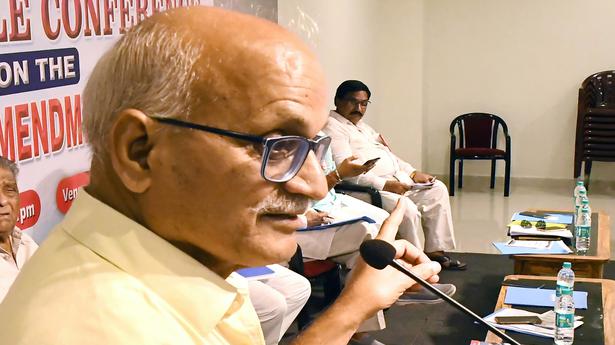
Centre is keen on privatising the entire power sector, alleges AIPEF chairman
The Hindu
‘Electricity (Amendment) Bill allows private players to mint money’
A lineman climbed a pole to disconnect the power supply to a local police station in Uttar Pradesh. A policeman asked: “What are you doing?” He coolly replied: “The other day you had imposed a fine of ₹1,000 on me for not wearing a helmet. Your police station owes dues, running into thousands of rupees, to our (electricity) department.”
Many government offices and departments in various States have to go without power, if the same principle is applied to them. The total dues to public sector discoms, in the country, payable by the government offices and establishments is ₹76,000 crore, and in addition to this, the State governments owe ₹78,000 crore to the discoms for providing free power to farmers and subsidised power to weaker sections, says Shailendra Dubey, chairman, All India Power Engineers Federation (AIPEF).
Mr. Dubey was in the city to participate in the roundtable on the ‘Electricity (Amendment) Bill, 2022, organised by the AP State Power Employees JAC (APSPE JAC) recently.
“The power generation capacity of India is 4 lakh mw and 49.5% of the installed capacity is already in private hands. The Cente is keen on privatising the entire power sector, ignoring the interests of farmers and common consumers, to benefit the corporate groups,” Mr. Dubey said in a chat with The Hindu.
“The amendment bill provides for operation of more than one distributor (licensee) in an area. We are not against healthy competition but this bill allows private players to ‘mint money’ in the name of ‘distribution’ and the government discoms have to spend thousands of crores of rupees on maintenance of distribution lines and assets besides adding new infrastructure,” he alleged.
The average cost of service for every unit of power is ₹7.45 paise. The State-owned discoms are providing an average of 55 paise subsidy on each unit to domestic consumers. This subsidy is being recovered by charging higher tariff for industries and commercial consumers (cross subsidy).
The new licensing policy allows for ‘cherry picking’ and the private players would only choose the profitable sectors like industrial and commercial consumers, where they can get higher returns. The government discoms, by default, would incur losses as they would be left with rural and domestic consumers, who would not be willing to pay higher tariff.

‘Instead of accusing Gen-Z of lacking skills or discipline, we need to ask what drives them’ Premium
At a recent event held in the city, Cambridge University Press & Assessment launched an advisory panel comprising leaders from top global corporations, aiming to bridge the employability gap in India and better align academic output with industry needs. A whitepaper released at the event highlighted the growing importance of communication skills, the need for stronger collaboration between industry and universities, and strategies to bridge the persistent skill gap.

Under the NBS, newborns are screened for communication disorders before they are discharged from the hospital. For this, AIISH has collaborated with several hospitals to conduct screening which is performed to detect hearing impairment and other developmental disabilities that can affect speech and language development. The screening has been helping in early intervention for those identified with the disorders, as any delay in the identification poses risk and affects successful management of children with hearing loss, according to AIISH.











